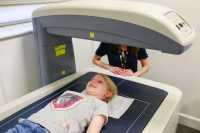
09 Aug Early Puberty Linked to Stronger Bones
MedicalResearch.com Interview with:
Dr Ahmed Elhakeem PhD
Senior Research Associate in Epidemiology
University of Bristol
MedicalResearch.com: What is the background for this study? What are the main findings?
Response: We know that the denser (stronger) your bones are, the less likely they are to break (fracture).
We also have reliable evidence that later maturing adolescents tend on average to have lower bone density than their earlier maturing peers.
We wanted to find out how the timing of puberty might influence the development of bone density throughout adolescence and into early adult life. We did this by following up a large group of young people born in the early 90s around Bristol, UK that took part in a unique study (the Children of the 90s study) that included repeated density scans over a 15-year period from age ten to 25.
We found that those later maturing adolescents that got their growth spurt at an older age tended to catch-up to some degree to their earlier maturing peers during puberty however, they continued on average to have lower bone density than average for several years into adulthood.
MedicalResearch.com: What should readers take away from your report?
Response: Our research adds to the evidence that children who mature later may be at increased risk of fractures as they grow. They may also have increased risk of the fragile bone condition osteoporosis in later life
MedicalResearch.com: What recommendations do you have for future research as a result of this work?
Response: There is a clear need for more high-quality research to understand the driving forces behind the very complicated web of relationships between puberty, growth and bone development. This new research should make use of different types of study designs to help build a better picture of what’s going on. We also need to better understand the lifestyle factors that influence bone development, for example, the type of physical activity that is most beneficial to children’s growing bones. Altogether, this will further our understanding of the causes of osteoporosis and provide more reliable evidence that can ultimately help people to maintain good bone health throughout life.
Any disclosures?
The Children of the 90s study receives funding from the UK Medical Research Council, Wellcome and University of Bristol. A comprehensive list of grant funding for the Children of the 90s study can be found at http://www.bristol.ac.uk/alspac/external/documents/grant-acknowledgements.pdf
I have no disclosures
Citation:
[wysija_form id=”3″]
[last-modified]
The information on MedicalResearch.com is provided for educational purposes only, and is in no way intended to diagnose, cure, or treat any medical or other condition. Always seek the advice of your physician or other qualified health and ask your doctor any questions you may have regarding a medical condition. In addition to all other limitations and disclaimers in this agreement, service provider and its third party providers disclaim any liability or loss in connection with the content provided on this website.
Last Updated on August 9, 2019 by Marie Benz MD FAAD

